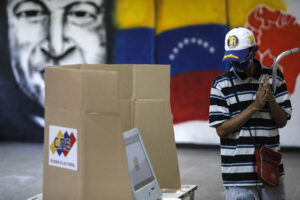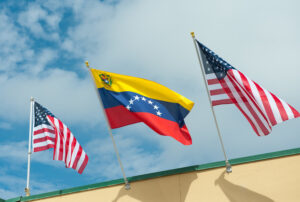A conversation with Laura Dib and Dr. Francisco Monaldi
Moderated by: David Smilde
Date: February 16, 2024
A video recording of the event is available here.
After the signing of the Barbados Agreement in 2023 between the Maduro government and the opposition, Venezuela seemed to be on the road to democratization. However, the recent disqualification of opposition candidates and the arrest of human rights activists, has put the country’s future into question.
WOLA’s Director for Venezuela, Laura Dib, joined the Director of the Latin American Energy Program from Rice University’s Baker Institute for Public Policy, Dr. Francisco Monaldi, and WOLA Senior Fellow and Professor at Tulane University, David Smilde, to talk about the challenges on the road towards elections in Venezuela.
Here are four key takeaways from the conversation:
1. There is a lack of popular support for Maduro’s government
Since the signing of the Barbados Agreement back in October 2023 there have been key advancements in efforts to address the humanitarian crisis in Venezuela and pave the way for democratic elections.
The agreement between the Maduro government and the Venezuelan opposition, Plataforma Unitaria Democrática, established a clear roadmap for free and fair elections and led to the ease of U.S sanctions on Venezuela’s oil industry that had crippled the country’s economy. It also involved side negotiations for the release of political prisoners.
Following the signing of the agreement, Venezuela conducted primary elections that confirmed popular discontent with the Maduro government. The elections were marked by high participation and the overwhelming support of opposition candidate, María Corina Machado. They also defied expectations in areas where the incumbent government had once dominated.
Laura Dib said that the primaries were proof that “there is still confidence and belief in the right to vote as a means of transforming political conflict.”
Popular discontent is fueled by the complex humanitarian crisis that many Venezuelans are currently facing. According to UN Venezuela 69% of the population lives in multidimensional poverty.
2. It’s time for high-level diplomacy
In the face of popular discontent, the Venezuelan government has retreated from its path toward democracy.
In January, the National Assembly threatened to pass legislation limiting the work of civil society and the Supreme Court disqualified the popular opposition candidate, María Corina Machado from participating in the general elections.
In February, a well-known Venezuelan human rights activist, Rocío San Miguel, was forcibly disappeared for days, only to be reported later as being held in one of the country’s political prisons. After the United Nations Human Rights Mission in Venezuela issued a statement following San Miguel’s detention, the Maduro government gave the mission 72 hours to leave the country.
These setbacks raise questions about Venezuela’s future and the relevance of the Barbados Agreement. At the international level, critics and international organizations have condemned the actions of the Maduro government and called for the reinstatement of sanctions.
But for Laura Dib, it is now key that the United States seek high level diplomacy to pressure the Venezuelan government into sticking to the Barbados agreement. There needs to be constructive dialogue between the opposition, the government and the United States.
“It is not the time to burn the bridges but rather to protect them” explained Laura.
3. The key is in the details
The significance of the Barbados Agreement lies in the details. The language of the Barbados Agreement serves as a foundation for Venezuela’s path to democracy because it highlights the necessary steps needed to ensure free elections.
The agreement outlines specific steps to establish an agreed process for disqualification, create an election calendar, and revitalize the country’s voter registry.
The electoral calendar is key in ensuring that international missions can participate in the overseeing of the electoral process. The electoral registry is another key aspect of the electoral process. According to NGO Voto Joven, around 3.5 million NEW voters are not registered. 2.5 million need to update their information.
Laura explains that the registry should be permanent but it’s not. The offices are only located in regional cities so rural areas are usually neglected. The government announced that they will be placing mobile sites for the registration but this has not been done.
There is also the registry of voters abroad, in which around 107,000 are eligible to vote. However, in order to vote from abroad, Venezuelans require a passport. This makes voting accessible due to the lack of consulate support abroad, especially in the United States.
All these points are emphasized in the Barbados Agreement but are not currently being implemented. Laura Dib and Dr. Monaldi emphasize the need for the international community and the opposition to create a process to monitor compliance with the Barbados Agreement.
4. The complex role of sanctions
The recent democratic setbacks have also made sanctions a hot topic of discussion. However, the role of sanctions in the context of Venezuela is not as clear-cut as it may seem.
Since 2017, the United States has imposed sanctions on Venezuela that have crippled its oil-based economy. Many of the sanctions are directly related to PDVSA, the state-owned oil company, and its access to the U.S. oil market. Sanctions imposed during the Trump administration have prevented U.S. companies from investing in Venezuela’s oil industry, which in turn has led to the deterioration of PDVSA and the country’s oil production.
Following the signing of the Barbados Agreement, the United States granted Venezuela a six-month permit known as General License 44, which allows PDVSA to participate in the oil market. The U.S. has also allowed U.S. companies to invest in the Venezuelan oil industry. This has allowed Chevron to re-enter the Venezuelan oil industry. All of these changes have benefited the Venezuelan economy.
The easing of sanctions under the Barbados Agreement was intended to serve as an incentive for the Maduro government to move forward with fair and free elections. But as Dr. Monaldi points out, sanctions have not been sufficient to bring about democratic change.
It was expected that Maduro would comply with the agreement due to the benefits that the easing of sanctions has brought to the country, but this was not the case. Now, “the political cost to the Biden administration of simply renewing GL 44 without doing anything has increased because of Maduro’s recent aggressiveness,” Dr. Monaldi explained.
But reimposing sanctions is not as easy as it might seem. The burden of sanctions is borne primarily by the economy and, by extension, by the Venezuelan people.
Sanctions have also exacerbated the humanitarian crisis in Venezuela and the waves of immigration to the United States. Oil sanctions are also strongly linked to the global oil market, and with the Ukraine-Russia war and the Gaza conflict, the U.S. now has more factors to consider.
“There might be a partial reinstatement of some of the sanctions, meaning not full approval of GL 44,” said Dr Monaldi..
On immigration, Laura pointed out that “It’s important not to fall into the narrative that if sanctions are lifted people will immediately stop migrating, why? Because the complex humanitarian emergency is so deep and is linked to the undermining of democratic institutions and corruption”
It is key to advocate for a more humane approach to the immigration crisis and recognize that “there is a humanitarian emergency, the need of a democratic transition in order to attend to the needs of people.”


